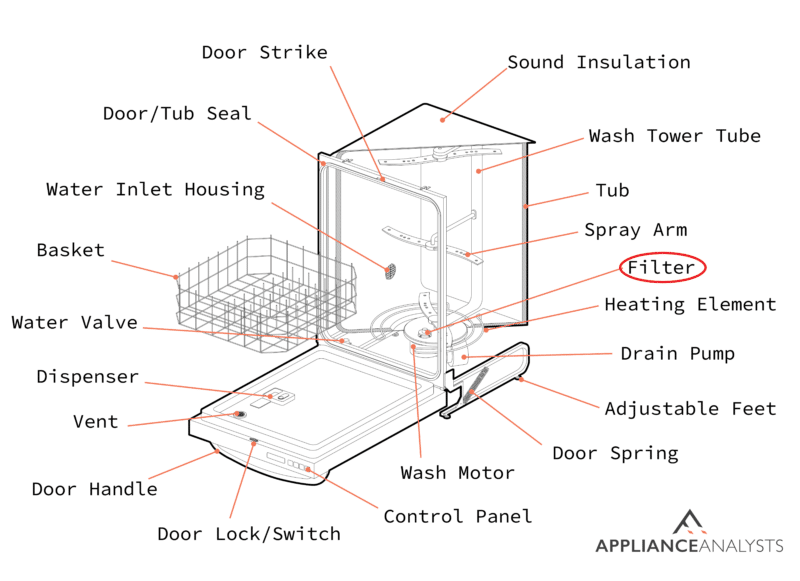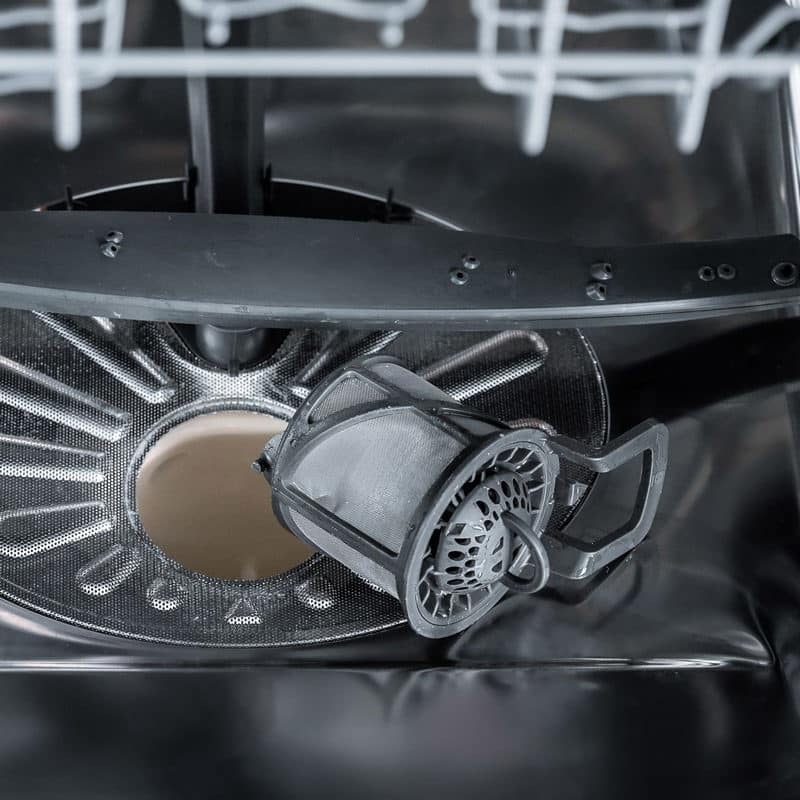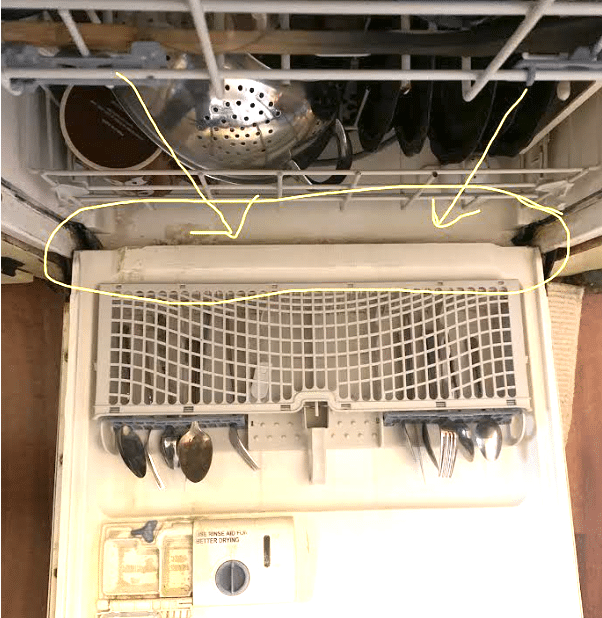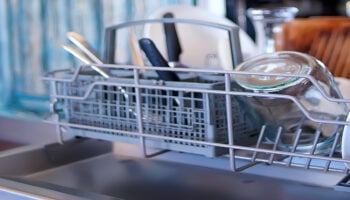We've independently reviewed this article to make sure it's as accurate as we can make it.
To find out more about our article creation and review process, check out our editorial guidelines.
Stuck trying to figure out why your dishwasher smells like eggs?
Don’t worry, you’re not alone. The rotten egg smell can happen due to old food particles decaying within your dishwasher.
Luckily, you’ve come to the right place for answers.
If your dishwasher smells like eggs, use a tablet cleaner and run the hottest cycle. It’s also important to clean the filter, garbage disposal, and gasket. Don’t forget to clean behind and underneath the unit and use an odor-neutralizer.
Read on to get rid of the unpleasant odor!
Why trust us? This article was written by Craig Anderson and James Blackford.
Craig has helped thousands of other homeowners repair their appliances since 2016.
James is one of our resident appliance experts, with over 16 years of experience. He currently works as a Master Technician for SquareTrade, and runs his own appliance repair business.
How to Get Rid of the Rotten Egg Smell in Your Dishwasher: 8 Simple Steps
The rotten egg smell in your dishwasher comes from bacteria known as “sulfur bacteria“. When these bacteria consume the food debris left in your machine, they produce a gas called hydrogen sulfide, which smells like eggs.
Don’t worry, though. Getting rid of the rotten egg smell in your dishwasher is very simple. You’ll just need to:
#1 Run a Dishwasher Cleaner
You can eliminate the rotten egg smell coming from your dishwasher by using a tablet cleaner and running a clean cycle. Or if you don’t have a clean cycle, just use the hottest cycle available.
If the rotten egg smell is really strong, it may take a few treatments to eliminate it.
Once you’re done cleaning your dishwasher, leave the door open to allow moisture to escape and prevent unpleasant odors and mold.
In my experience, using tablet cleaners in your dishwasher once a month works wonders in preventing and reducing odors. Don’t forget to use a sanitizer every 3 to 6 months, you’ll usually find it in a bottle with a wax seal.
#2 Clean the Filter
To completely eliminate the rotten egg smell from your dishwasher, I also recommend cleaning the filter.

The filter is a component that is located at the bottom of the unit. It helps clean the water as it leaves the dishwasher compartment to the garbage disposal.
In my experience, one of the easiest ways to clean your dishwasher filter is by soaking it in hot soapy water and using a wire or stiff nylon brush. Focus on removing any food particles, as they can serve as magnets for bacteria.
It’s important to clean your filter at least once a month to ensure it works in its top-notch condition.

#3 Check and Clean the Garbage Disposal
Your dishwasher and garbage disposal are generally piped into the same system. If the rotten egg smell is due to the garbage disposal, it can end up leaking into your dishwasher.
In my opinion, cleaning your garbage disposal is relatively easy. All you need to do is put a stopper on the sink and fill it halfway with warm water. Then, add about ¼ cup of baking soda, 6 pounds of ice, and 1/3 cup of lemon juice to the water in the sink.
The main aim of the ice is to freeze and lift the stuck-on dirt from the blade. The baking soda and lemon water help remove odor, grease, and grim from the unit. Besides, the ice also helps sharpen the blades as it is being crushed.
You can also use a garbage disposal cleaner to get rid of the rotten egg smell, which is typically a foaming tablet that contains cleaning agents that deodorize and remove built-up food particles that accumulate over time.
Ensure you run the garbage disposal for several minutes before running the dishwasher to prevent backups into the unit.
#4 Check and Clean the Gasket
If your dishwasher still has a rotten egg smell, it’s important to check and clean the gasket, as food particles and grime can build up there.
In my experience, using warm soapy water or vinegar is one of the best methods to clean your dishwasher’s seal. Once you’re done, don’t forget to dry it with a clean cloth or paper towel.
Some dishwasher doors have a gasket at the very bottom. Make sure to wipe it down as well – use something stiff and skinny to get there.
Keep in mind that right where your door meets the top of your dishwasher, there’s a gap. Over time, gunk can accumulate in that space and cause a rotten egg smell in your dishwasher. It’s also important to clean it regularly by running a rag down there.

While at it, check for other issues, such as wear on the seal. Also, ensure you inspect the edges where the seal touches the unit and wipe them down.
If you want to get any replacement part – or see how much one would cost – click to enter your model number in the search bar below. Our partners at AppliancePartsPros stock almost every part with free guides on how to install them.

#5 Use an Odor Neutralizer
It’s also crucial to use an odor-neutralizer to get rid of the rotten egg smell coming from your dishwasher.
Spread one cup of baking soda at the bottom of your dishwasher and leave it overnight. Place a cup of vinegar on the top rack the next morning and run the hottest cycle available.

If the vinegar smell lingers afterward, run an empty cycle to rinse any residue.
#6 Check For Hard Water Issues
If your dishwasher still smells like eggs, you’re probably dealing with hard water. This leads to mineral buildup and creates an ideal breeding ground for bacteria.
To determine if you have hard water, purchase a test kit, which is available in most home improvement stores or online retailers.
If you do indeed have hard water that’s causing the rotten egg smell in your dishwasher, I recommend adding a tablespoon of salt to the soap dispenser before adding the detergent. Salt will act as a water softener and help prevent mineral buildup.
Using rinse aid in hard water areas is also crucial, as it will help reduce water spots and improve drying results.
#7 Check the Electrical Connection
If you’ve tried the fixes above, but your dishwasher still has a rotten egg smell, then you’ll need to check the electrical connection.
Weak links can sometimes lead to a foul odor in your dishwasher. Control the junction box beneath the dishwasher door. Unplug it and contact an electrician if the appliance has a problem.
#8 Check for Dead and Decomposing Pests
It’s also important to check behind or below the unit.
There’s a good chance there are food particles beneath the machine or a dead mouse stuck behind the dishwasher, causing the rotten egg smell.
Disconnect the dishwasher and clean behind and underneath the unit. Try using vinegar or bleach to disinfect and eliminate the bacteria that is causing the rotten egg smell. Make sure to dry the area before putting the dishwasher back into place.
You should NEVER mix bleach with vinegar, as this can create toxic fumes that can be harmful to your health.
6 Quick Maintenance Tips For Your Dishwasher
Apart from the fixes above, I recommend these maintenance tips to prevent the rotten egg smell from reappearing in your dishwasher:
- Always make sure to leave the dishwasher door open after use. Keeping the door closed makes a bacteria paradise (a dark box with moist air) that can create a rotten egg smell. Leaving the door open will help stop bacteria and smells from building up.
- Ensure you scrape off large food particles from the dishes before placing them in the dishwasher. It will reduce the chances of a blockage and bacteria that cause unpleasant odors. The unit will also perform better when there is less food residue.
- Clean your dishwasher’s spray arm around once a month with a good scrub. This helps prevent grime, grease, or food debris buildup that could cause a rotten egg smell.
- Avoid over-staking your dishwasher. It will help the unit to apply detergent and wash the dishes evenly, which will help prevent odors.
- Use hot water to break down stubborn food particles that can cause a rotten egg smell in your dishwasher. To ensure the water is at the correct temperature (120ºF), use a thermometer. You can also run the kitchen faucet and touch the water with your hand. If you need to pull it out after a few seconds, then the water is at the right temperature.
- Pour a cup of lemon juice into the dishwasher and run a full cycle regularly. The citric acid in the juice will help clear any odor in the dishwasher.
Still Stuck?
If you have tried all the above steps and still can’t clear the rotten egg smell from your dishwasher, I recommend calling a repair service.
Your safety is fundamental, so you should only conduct mechanical repairs if you are capable and comfortable. You can either contact your dishwasher company or research the best cleaner in your area.
Conclusion
When you open your dishwasher and get hit by the smell of rotten eggs, you may probably think twice about putting your dishes in there.
Fortunately, there is quite a wide range of cleaning methods. Remember to use a tablet cleaner, clean your dishwasher’s filter and gasket, and use an odor-neutralizer. Don’t forget to check for hard water issues and decomposing pests.
Liked the article? Please take a look at our related guides for more helpful tips to make the most out of your dishwasher.







